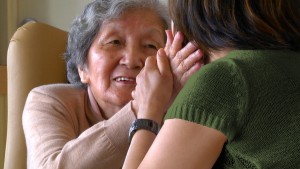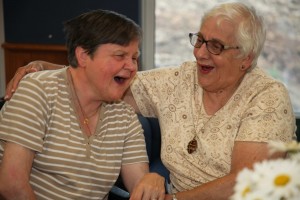
With continuing budget cutbacks and scarcity of resources, value-for-money matters.
New research has found a solution that will give you a significant social return on your investment (SROI)1. SROI is derived from analytical methods such as cost-benefit analysis and social accounting and has become a recognised method of measuring impact, outcomes and value created by interventions or organisations (Millar & Hall, 2013).
Imagine this: direct healthcare savings by residents giving other residents emotional social support which helps prevent avoidable and expensive hospitalizations.
The research took place in England and examined the outcomes of three dementia peer support groups and how much social value they produced compared to the cost of investment.
The authors found the SROI produced ranged from $2.17 to $9.59 for every dollar of investment (converted to Canadian dollars).
That is double your money and more, even for the lowest value in the range! These days there are very few investment opportunities that yield that kind of a return.
The key outcomes in this study included a reduction in loneliness and isolation in those participating in the peer support groups. The outcomes also included a reduction in stress and burden for those caring for them.
OMNI Health Care Makes a Social Investment
While most homes provide programs such as social gatherings designed to address psychosocial needs, studies suggest that these activities tend to be characterized by passive participation and low engagement.2-3
Country Terrace (OMNI Health Care) decided to put funding from the Behavioural Supports Ontario (BSO) program towards implementing an innovative research-based peer support program called the Java Music Club and training staff members.
BSO is an initiative to help enhance quality of life for seniors affected by dementia and other conditions that cause agitation. The funding, which is provided to long-term care homes through Ontario’s 14 Local Health Integration Networks, is largely put towards staff education.
At first there were nine residents involved with the Java Music Club at Country Terrace.
Today, there are 63 residents involved in the program, more than half the Komoka long-term care home’s population. www.omniway.ca/resident-interest-in-country-terrace-music-program-blossoms
“It was almost like therapy for them,” says Life Enrichment Co-ordinator, Christie Patterson.
 Peer Support—A Worthwhile Social Investment
Peer Support—A Worthwhile Social Investment
Peer support can lead to direct healthcare savings which lessens the risk of potentially avoidable and expensive medical interventions.
Willis, Semple, & de Waal (2016) provide economic evidence for those interested in investing in setting up peers support groups as a foundational structure for recreation within their home.
Their findings demonstrate that peer support is clearly a worthwhile investment showing tremendous social value for those with dementia and for those that care for them.
Submitted by Kristine Theurer,
Java Group Programs Founder & President
MA (Gerontology), PhD Candidate, University of British Columbia
References
1Willis, E., Semple, A., and de Waal, H. (2016). Quantifying the benefits of peer support for people with dementia: A social return on investment (SROI) study. Dementia. DOI: 10.1177/1471301216640184
2Alzheimer Disease International (2013). World Alzheimer Report 2013: Journey of caring: An analysis of long-term care for dementia. London, England: Alzheimer Disease International.
3Port, A,. Barrett, V. Gurland, B., Perez, M., and Riti, F. (2011). Engaging nursing home residents in meaningful activities. Annals of Long-Term Care, 19(12). http://www.annalsoflongtermcare.com/article/engaging-nursing-home-residents-meaningful-activities
